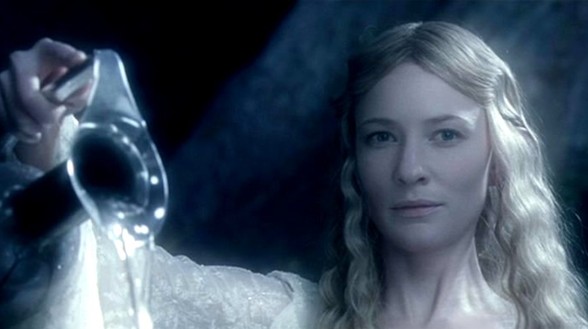
One of my favorite characters in all of fiction is Aslan, the Christ-figure in The Chronicles of Narnia by C.S. Lewis. The only thing really different from the Scriptural Jesus is the physical form of a lion instead of a person (alluding to Old Testament prophesies about Him being the Lion of the Hebrew tribe of Judah). Aslan is an ancient, all-powerful being, whose very voice brings about creation. The very mention of His name brings a visceral joy response in one’s soul and is readily awaited by many in Narnia. But when asked if He is safe, Mr. Beaver responds that of COURSE he isn’t “safe!” He is, however, Good. The very instant the moment comes for him to destroy Jadis the White Witch, he does so with terrifying swiftness and sets about healing the fallen of His army with equal speed.
Very closely related in the kind of effect a character can bring is J.R.R. Tolkien’s The Lord of the Rings. Galadriel is a noldor elf so powerful that she fought alongside the other members of the Council against Sauron at Dol Guldur. Wielder of one of the three Elvish rings of power, it is her influence that causes the blessed forest of Lothlorien to be warded so fiercely against the cursed influences and armies of Sauron. She also successfully resists the temptations of the Ring. She is a character undoubtedly good, yet you must tread easily around her and show a degree of caution and respect. When tempted by the One Ring, Frodo gains a shocking glimpse of her unleashed power.

“She stood before Frodo seeming now tall beyond measurement and beautiful beyond enduring, terrible and worshipful.”
Chapter VII – The Mirror of Galadriel, The Fellowship of the Ring
I sometimes worry about how as we try to move away from the fear of differences, we start to move towards another temptation which turns into a fear and hatred of anyone who might be superior in any sort of way, a dislike of anyone or anything that rises above the horizon line. Even in characters, I notice that the judgements new storytellers seem to be very fickle. They don’t like the stubborn, the stand-offish, and especially not the mysterious, the powerful or the remotely dangerous. There’s a feeling that “if you were really good, you wouldn’t make me feel small or threatened or afraid.”
We as storytellers, in this atmosphere, are tempted to always undercut any character who seems to be powerful or otherworldly with some humbling element, undercut with a flippant joke, anything just to not seem so “below” or inferior. Is it perhaps the manifestation of some kind of literary Napoleon complex? Or is it perhaps that our sensibilities have shrunken in size as to not be able to accept or relate to any character that is not immediately “brought down to our level” such that we cannot even include such characters as “Good” regardless of how they make us feel? Perhaps in recent times our understanding of what a good guy can be (or allowed to be) has been cut short.
Lewis actually addressed this in the very passage of The Lion, The Witch and the Wardrobe where the Pevensie children meet Aslan for the first time.
“People who have not been in Narnia sometimes think a thing cannot be good and terrible at the same time. If the children had ever thought so, they were cured of it now. For when they tried to look at Aslan’s face as they caught a glimpse of the golden mane and the great, royal, solemn, overwhelming eyes; and they found they couldn’t look at him and went all trembly.”
Chapter Twelve – Peter’s First Battle, The Lion, The Witch and the Wardrobe
It is rather intriguing. At a time when “understanding” is king, I notice that there doesn’t seem to be much effort put behind it when this is involved. Is it fear? Is it resentment? Perhaps it points to what C.S. Lewis called “I’m as good as you” state of mind, a way he attempted to shorthand an attitude of combativeness and resentment against anyone or anything that might have what we want. He traces it from our acknowledgement of God’s superiority and follows it to its natural conclusion where anyone who reminds us of that lacking element causes us to respond with ire.
After all, we’ve certainly lost sight of the idea that the God of the Old Testament and the New Testament are the same God. Could the idea that Christ is both the only comfort AND the supreme terror, the Love that is satisfied with a little yet demands all perhaps be the core issue that wraps all of this up?

In the end, I do not have all the answers. But one thing I do hope in the end is to see this archetype of Good character return to fiction at large. That element of the unknown, the mysterious and the awe-inspiring and fearful part of Good is an extremely important element of the olest, most enduring stories that made us strive and endure to become something more, someone better each day. Perhaps we can be the ones to bring this back.
Until next time, Godspeed and Peace be with ya!